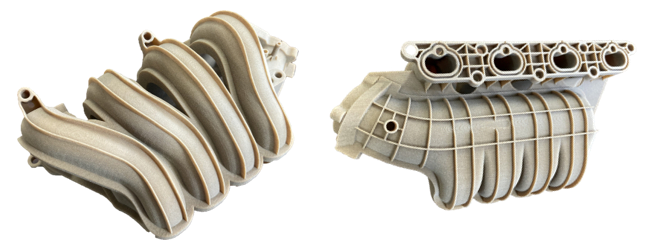Spherical Nylon 6 Particle for Powder Bed Fusion 3D Printers
Toray has initiated sales of Toraypearl PA6 said to be the “first” truly spherical nylon 6 particle.
Toray Industries has completed a mass production system and initiated sales of Toraypearl PA6, said to be the “first” truly spherical nylon 6 particle and offers outstanding high strength, heat resistance, and surface smoothness for powder bed fusion 3D printers. Such platforms, commonly used in industrial applications, lay down metal and resin particles. Lasers serve as heat sources to repeatedly melt and solidify modeled parts. Toray’s production facility for this offering should be fully operational by the fiscal year ending March 2026.

Powder bed fusion 3D printers offer the 3Dprinted parts with excellent dimensional accuracy and efficiency. Metals are for applications requiring exceptional strength whereas resins are commonly used because of lightness and affordable costs. However, polymer particles containing the mainly used nylon 12 and others are irregular shapes. Printed surfaces thus require polishing and other post-processing to use them in prototypes or end-use parts, increasing costs and lead times being the issue. This prompted Toray to apply its proprietary nylon particle technology to nylon 6, which has a high melting point and good mechanical properties. The company’s technology creates spherical particles when nylon is polymerized from monomrs, and can be applied with nylons 6, 66, 12 and other nylons.
This offering caters to customer demand for printed parts with smoother surfaces, greater strength and heat resistance under tougher conditions. The outstanding performance characteristics of Toraypearl PA6 enable 3D printing of complex and precise shapes as well as smooth surface, this can reduce the need for polishing and other post-processing stages. Furthermore, spherical particles ensure the fluidity needed for 3D printing, even when blended with reinforcing glass fibers, for modeling that combines excellent rigidity with the attributes mentioned above.
Toray will leverage these features in initially proposing prototypes for automotive parts, power tools, and other equipment requiring a lot of strength, heat resistance, and precision. It ultimately looks to expand into the 3D printer market for end-use parts.
Related Content
-
Lanxess and DSM Engineering Materials Venture Launched as ‘Envalior’
This new global engineering materials contender combines Lanxess’ high-performance materials business with DSM’s engineering materials business.
-
Automotive Awards Highlight ‘Firsts,’ Emerging Technologies
Annual SPE event recognizes sustainability as a major theme.
-
Prices for All Volume Resins Head Down at End of 2023
Flat-to-downward trajectory for at least this month.












